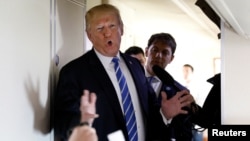President Donald Trump seems to be relying more on his gut political instincts in recent weeks. Whether it is sending U.S. troops to the border with Mexico or imposing tariffs on Chinese goods, Trump seems to be harkening back to his roots as a presidential candidate in 2016, eager to wear the badge of a political disrupter, much as he promised on the campaign trail.
Emblematic of this shift in style, Trump literally tossed away his prepared script during a recent discussion on tax reform in West Virginia, where he continues to enjoy high approval ratings.
"You know, this was going to be my remarks. It would have taken about two minutes. But the hell with it! That would have been a little boring, a little boring," Trump told the crowd.
Cheered by his base
The audience seemed to delight in Trump's decision to go off script, and it stands out as a symbolic moment that seems to frame the Trump presidency. After sifting through a long list of advisers, Trump seems more eager to return to his roots as a freewheeling candidate eager to please his hardcore base of supporters.
Trump's decision to go after China on trade is a classic example of his desire to follow through on a campaign promise popular with much of his base.
"For many years, no president wanted to go against China economically, and we are going to do it," Trump told the crowd in West Virginia.
Trump kept up his barrage Monday on Twitter, referring to "stupid trade" with China.
Worried about retaliation
But as China responds with trade actions of its own, some American farmers are getting nervous about where all of this might lead.
"We are looking forward to more profits this year than last year because of the tax cut. Hopefully, we don't have to give it all away due to the tariffs," said Iowa hog farmer Jeff Rehder.
Whether it is expressing a desire for U.S. troops to be pulled out of Syria or using them to beef up the Mexican border to stop illegal immigration, Trump appears to be listening more to his gut political instincts.
"It signifies to me that Donald Trump believes that he can run the whole shebang [administration] and that he can do it from Twitter," said University of Virginia analyst Larry Sabato via Skype. "And that includes whether it is declaring new policy or arranging for the firing of a secretary of state or any number of other things."
Echoes of the campaign
Others see the latest shift as a natural evolution of the man who made bold promises on the campaign trail, especially his vow to be a political disrupter.
"He was a strong outsider, so I think you could argue he had to find his way. Look, I think the president is always going to be this way to some extent," said John Fortier of the Bipartisan Policy Center in Washington.
WATCH: Trump unscripted
Trump prefers to visit friendly states with lots of supporters, such as West Virginia, where his disruptive nature continues to play well. "He doesn't seem tremendously interested in broadening his base for the most part," said Michael Barone of the American Enterprise Institute. "He seems interested in pursuing policies, in rough form at least, that he advocated."
Democrats plan a reckoning
But opposition Democrats have a different take on Trump's reliance on his gut political instincts.
Ken Gude of the Center for American Progress said the president's actions are helping to motivate Democrats, and that could lead to a political reckoning for Trump and his fellow Republicans in the congressional midterm elections in November.
"It seems as if Donald Trump is energizing Democrats like we haven't seen in a very long time. And as a result of that, they are turning out in much, much higher numbers up and down the federal, state and local level."
House Speaker Paul Ryan insists Republicans can limit the damage in November by emphasizing the Trump tax cuts. "We need to execute, we need to get our message and we need to make sure that our candidates are not massively outraised and outspent on TV," Ryan said.
Like many Republicans, Ryan will be keeping a close eye on Trump's public approval rating as the months tick down to the midterms. Trump's approval has increased slightly in recent days in several polls, but his average approval is still around 41 percent, and that usually is a precursor to significant congressional losses for the party holding the White House during a midterm election.








